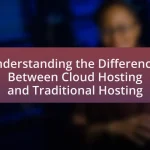The article focuses on the future of Virtual Private Server (VPS) hosting, highlighting emerging trends for 2024. Key trends include the increased adoption of cloud-based VPS solutions, enhanced security features, and the integration of artificial intelligence for resource management. The demand for VPS hosting is projected to grow significantly, driven by the need for scalable and flexible solutions, particularly in industries such as e-commerce and software development. The article also discusses technological advancements, user expectations, and the evolving landscape of customer support and pricing models in VPS hosting, while addressing the challenges and risks providers face in a competitive market.
What are the emerging trends in VPS hosting for 2024?
Emerging trends in VPS hosting for 2024 include increased adoption of cloud-based VPS solutions, enhanced security features, and the integration of artificial intelligence for resource management. Cloud-based VPS solutions are gaining traction due to their scalability and flexibility, allowing businesses to adjust resources on demand. Enhanced security features, such as automated backups and advanced firewalls, are becoming standard as cyber threats evolve. Additionally, the use of artificial intelligence in VPS hosting is streamlining resource allocation and optimizing performance, which is supported by a growing number of service providers implementing AI-driven management tools.
How is the demand for VPS hosting changing in 2024?
The demand for VPS hosting is expected to increase significantly in 2024. This growth is driven by the rising need for scalable and flexible hosting solutions among businesses, particularly as more companies transition to remote work and digital operations. According to a report by MarketsandMarkets, the VPS hosting market is projected to grow from $5.4 billion in 2023 to $10.5 billion by 2028, indicating a compound annual growth rate (CAGR) of 14.5%. This trend reflects the increasing reliance on cloud services and the need for enhanced performance and security, which VPS hosting provides compared to shared hosting options.
What factors are driving the increased demand for VPS hosting?
The increased demand for VPS hosting is primarily driven by the need for enhanced performance, scalability, and security. Businesses are increasingly seeking reliable hosting solutions that offer dedicated resources and greater control over their environments, which VPS hosting provides compared to shared hosting. Additionally, the rise of e-commerce and online services has led to a surge in traffic, necessitating scalable solutions that can adapt to fluctuating demands. According to a report by MarketsandMarkets, the global VPS hosting market is expected to grow significantly, reflecting this trend as organizations prioritize robust hosting options to support their digital operations.
How do user expectations influence VPS hosting trends?
User expectations significantly influence VPS hosting trends by driving demand for enhanced performance, scalability, and customer support. As users increasingly seek reliable and high-speed hosting solutions, VPS providers are compelled to optimize their infrastructure and services to meet these expectations. For instance, a survey by HostingAdvice in 2022 indicated that 70% of users prioritize uptime and speed, prompting VPS providers to invest in advanced technologies like SSD storage and optimized network configurations. Additionally, the growing expectation for personalized customer service has led to trends in offering tailored support options, such as 24/7 live chat and dedicated account management, further shaping the VPS hosting landscape.
What technological advancements are shaping VPS hosting?
Technological advancements shaping VPS hosting include containerization, improved virtualization technologies, and enhanced security protocols. Containerization, exemplified by Docker and Kubernetes, allows for more efficient resource utilization and faster deployment of applications, leading to better performance and scalability. Improved virtualization technologies, such as KVM and Xen, provide greater flexibility and isolation for virtual servers, enabling users to run multiple operating systems on a single physical server. Enhanced security protocols, including advanced firewalls and DDoS protection, ensure that VPS environments are more secure against cyber threats, which is critical as data breaches become increasingly common. These advancements collectively contribute to a more robust, efficient, and secure VPS hosting landscape.
How is cloud technology impacting VPS hosting solutions?
Cloud technology is significantly enhancing VPS hosting solutions by providing greater scalability, flexibility, and cost-effectiveness. This advancement allows users to easily adjust their resources based on demand, ensuring optimal performance without the need for physical hardware upgrades. According to a report by MarketsandMarkets, the global cloud computing market is projected to grow from $371.4 billion in 2020 to $832.1 billion by 2025, indicating a strong trend towards cloud-based solutions, including VPS hosting. This shift enables VPS providers to offer more robust services, such as automated backups, improved security features, and better resource management, ultimately leading to a more efficient hosting environment.
What role does virtualization play in the future of VPS hosting?
Virtualization is central to the future of VPS hosting as it enables efficient resource allocation and scalability. By allowing multiple virtual servers to run on a single physical server, virtualization optimizes hardware usage and reduces costs for providers and users alike. According to a report by MarketsandMarkets, the global virtualization market is expected to grow from $5.4 billion in 2020 to $12.4 billion by 2025, indicating a strong trend towards increased adoption in hosting environments. This growth underscores the importance of virtualization in enhancing performance, flexibility, and management of VPS hosting solutions.
What are the key features to look for in VPS hosting in 2024?
The key features to look for in VPS hosting in 2024 include scalability, performance, security, and customer support. Scalability allows users to easily adjust resources based on demand, ensuring optimal performance during traffic spikes. Performance is enhanced through SSD storage and high bandwidth options, which significantly improve loading times and overall user experience. Security features such as DDoS protection, firewalls, and regular backups are crucial for safeguarding data. Additionally, responsive customer support is essential for resolving issues quickly, with many providers offering 24/7 assistance. These features collectively ensure a reliable and efficient VPS hosting experience in 2024.
How important is scalability in VPS hosting services?
Scalability is crucial in VPS hosting services as it allows businesses to adjust their resources according to demand. This flexibility is essential for accommodating traffic spikes, ensuring optimal performance, and managing costs effectively. According to a report by Gartner, 70% of organizations consider scalability a key factor when selecting hosting solutions, highlighting its significance in maintaining operational efficiency and supporting growth.
What security measures should VPS hosting providers implement?
VPS hosting providers should implement robust security measures including firewalls, DDoS protection, regular software updates, and data encryption. Firewalls act as a barrier between trusted internal networks and untrusted external networks, helping to prevent unauthorized access. DDoS protection mitigates the risk of distributed denial-of-service attacks, which can disrupt service availability. Regular software updates ensure that vulnerabilities are patched promptly, reducing the risk of exploitation. Data encryption protects sensitive information both in transit and at rest, safeguarding against data breaches. These measures collectively enhance the security posture of VPS hosting environments, ensuring better protection for users’ data and applications.
How are businesses adapting to VPS hosting trends in 2024?
Businesses are adapting to VPS hosting trends in 2024 by increasingly leveraging cloud-based solutions for scalability and flexibility. This shift allows companies to efficiently manage fluctuating workloads and optimize resource allocation, which is crucial in a rapidly changing digital landscape. According to a report by Gartner, the global cloud services market is projected to grow by 21% in 2024, indicating a strong trend towards cloud adoption, including VPS hosting. Additionally, businesses are focusing on enhanced security measures, such as implementing advanced firewalls and DDoS protection, to safeguard their data in response to rising cyber threats. This proactive approach to security aligns with the findings from Cybersecurity Ventures, which predicts that cybercrime damages will reach $10.5 trillion annually by 2025, prompting businesses to prioritize secure VPS hosting environments.
What industries are increasingly adopting VPS hosting solutions?
The industries increasingly adopting VPS hosting solutions include e-commerce, software development, digital marketing, and education. E-commerce businesses utilize VPS for enhanced performance and security, allowing them to handle high traffic and sensitive customer data effectively. Software development companies leverage VPS for testing and deploying applications in isolated environments, which improves efficiency and scalability. Digital marketing agencies benefit from VPS hosting by gaining better control over their websites and applications, enabling faster load times and improved SEO. Educational institutions are also turning to VPS to host online learning platforms, providing reliable access to resources for students and educators. These trends indicate a growing reliance on VPS hosting across various sectors due to its flexibility, cost-effectiveness, and performance advantages.
How does VPS hosting benefit e-commerce businesses?
VPS hosting benefits e-commerce businesses by providing enhanced performance, security, and scalability. Enhanced performance is achieved through dedicated resources, which ensure faster loading times and improved user experience, critical for retaining customers and reducing bounce rates. Security is bolstered with isolated environments that protect sensitive customer data and transactions, addressing the increasing concerns over data breaches in e-commerce. Additionally, VPS hosting allows for easy scalability, enabling businesses to adjust their resources based on traffic fluctuations, particularly during peak shopping seasons, ensuring that they can handle increased demand without downtime. These factors collectively contribute to a more reliable and efficient online shopping experience, which is essential for e-commerce success.
What advantages does VPS hosting offer to startups and small businesses?
VPS hosting offers startups and small businesses enhanced performance, scalability, and cost-effectiveness. This type of hosting provides dedicated resources, which means that businesses experience faster load times and improved website performance compared to shared hosting. Additionally, VPS hosting allows for easy scalability; as a business grows, it can upgrade its resources without significant downtime or migration issues. Cost-effectiveness is another advantage, as VPS hosting typically offers a balance between the affordability of shared hosting and the power of dedicated servers, making it accessible for startups with limited budgets. According to a report by HostingAdvice, 70% of small businesses find VPS hosting to be a viable solution for their growing needs, highlighting its relevance in the current market.
How are service providers evolving their offerings in response to trends?
Service providers are evolving their offerings by integrating advanced technologies such as artificial intelligence, automation, and enhanced security features to meet the growing demands of customers. For instance, many VPS hosting providers are now offering managed services that include automated backups, real-time monitoring, and AI-driven resource allocation to optimize performance. Additionally, the shift towards cloud-based solutions has led providers to offer scalable and flexible hosting plans that can adapt to varying workloads, ensuring that businesses can efficiently manage their resources. This evolution is supported by the increasing need for businesses to enhance their digital presence and maintain operational efficiency in a competitive landscape.
What new pricing models are emerging in the VPS hosting market?
Emerging pricing models in the VPS hosting market include pay-as-you-go, subscription-based, and tiered pricing structures. Pay-as-you-go models allow users to pay only for the resources they consume, which offers flexibility and cost efficiency, particularly for businesses with fluctuating workloads. Subscription-based models provide predictable monthly costs, appealing to users who prefer stable budgeting. Tiered pricing structures offer different levels of service at varying price points, enabling customers to choose plans that best fit their needs. These models reflect a shift towards more customer-centric pricing strategies in response to market demand for flexibility and transparency.
How are customer support services changing in VPS hosting?
Customer support services in VPS hosting are evolving towards greater automation and personalization. The integration of AI-driven chatbots and support systems enables faster response times and 24/7 availability, addressing customer inquiries more efficiently. According to a report by Gartner, by 2024, AI will handle 75% of customer interactions, significantly enhancing the support experience. Additionally, VPS hosting providers are increasingly offering tailored support plans that cater to specific customer needs, ensuring a more customized approach to service. This shift not only improves customer satisfaction but also allows support teams to focus on more complex issues, thereby increasing overall service quality.
What challenges do VPS hosting providers face in 2024?
VPS hosting providers face several challenges in 2024, primarily related to increasing competition, evolving customer expectations, and the need for enhanced security measures. The competitive landscape has intensified as more providers enter the market, leading to price wars that can erode profit margins. Additionally, customers are demanding more from their hosting services, including better performance, scalability, and customer support, which requires providers to continuously innovate and improve their offerings. Furthermore, the rise in cyber threats necessitates robust security protocols, compelling VPS providers to invest in advanced security technologies and practices to protect their clients’ data. These challenges highlight the need for VPS hosting providers to adapt and evolve in a rapidly changing environment.
How do competition and market saturation affect VPS hosting?
Competition and market saturation significantly influence VPS hosting by driving prices down and enhancing service quality. As more providers enter the VPS market, they compete for customers, which often leads to lower pricing structures and more attractive service packages. For instance, a report from HostingAdvice in 2023 indicated that the average price for VPS hosting decreased by approximately 15% over the past two years due to increased competition. Additionally, market saturation compels providers to innovate and improve their offerings, resulting in better performance, enhanced security features, and more flexible plans to meet diverse customer needs. This dynamic ultimately benefits consumers, who gain access to higher-quality services at more competitive prices.
What strategies can VPS providers use to differentiate themselves?
VPS providers can differentiate themselves by offering specialized services tailored to niche markets. For instance, some providers focus on high-performance hosting for gaming applications, while others may cater to e-commerce businesses with enhanced security features. This specialization allows VPS providers to attract specific customer segments, thereby increasing customer loyalty and satisfaction. Additionally, implementing advanced technologies such as artificial intelligence for resource management and predictive analytics can enhance service efficiency and reliability, setting providers apart in a competitive market.
How can VPS hosting providers address customer retention issues?
VPS hosting providers can address customer retention issues by enhancing customer support and offering personalized services. Improved customer support, such as 24/7 availability and quick response times, directly impacts customer satisfaction, leading to higher retention rates. According to a study by Zendesk, 82% of customers feel more positive about a brand after having a positive customer service experience. Additionally, personalized services, including tailored hosting solutions and proactive communication about upgrades or issues, foster a sense of value and loyalty among customers. Research from HubSpot indicates that 70% of consumers prefer to learn about products through content rather than traditional advertising, highlighting the importance of engaging customers with relevant information.
What are the potential risks associated with VPS hosting?
The potential risks associated with VPS hosting include security vulnerabilities, resource contention, and management complexity. Security vulnerabilities arise because multiple users share the same physical server, increasing the risk of data breaches if one VPS is compromised. Resource contention occurs when one VPS consumes excessive resources, potentially degrading performance for others on the same server. Management complexity is a concern as users must handle server configurations, updates, and security measures, which can lead to misconfigurations and increased exposure to threats. These risks highlight the importance of proper management and security practices in VPS environments.
How can security vulnerabilities impact VPS hosting users?
Security vulnerabilities can significantly impact VPS hosting users by exposing their data and applications to unauthorized access and attacks. When a VPS is compromised due to security flaws, users may experience data breaches, loss of sensitive information, and potential financial losses. For instance, a report by Cybersecurity Ventures predicts that cybercrime will cost the world $10.5 trillion annually by 2025, highlighting the financial implications of security vulnerabilities. Additionally, compromised VPS environments can lead to service disruptions, affecting user operations and reputation. Therefore, the presence of security vulnerabilities poses a critical risk to VPS hosting users, necessitating robust security measures to mitigate these threats.
What measures can be taken to mitigate risks in VPS hosting?
To mitigate risks in VPS hosting, implementing robust security measures is essential. This includes using firewalls to protect against unauthorized access, regularly updating software to patch vulnerabilities, and employing strong password policies to prevent brute-force attacks. Additionally, utilizing data encryption ensures that sensitive information remains secure during transmission and storage. Regular backups are crucial for data recovery in case of hardware failure or cyber incidents. According to a 2021 report by Cybersecurity Ventures, cybercrime is projected to cost the world $10.5 trillion annually by 2025, highlighting the importance of these security measures in protecting VPS environments.
What best practices should users follow when choosing VPS hosting?
When choosing VPS hosting, users should prioritize performance, scalability, and support. Performance is critical; users should select a provider that offers high uptime guarantees, typically above 99.9%, to ensure their applications remain accessible. Scalability is also essential; users should choose a VPS hosting plan that allows for easy upgrades to accommodate future growth, as many businesses experience fluctuating resource needs. Additionally, robust customer support is vital; users should look for providers that offer 24/7 support through multiple channels, such as live chat, phone, and email, to resolve issues promptly. These best practices help ensure a reliable and efficient hosting experience.
How can users assess the reliability of a VPS hosting provider?
Users can assess the reliability of a VPS hosting provider by examining uptime guarantees, customer reviews, and support responsiveness. Uptime guarantees typically indicate the provider’s commitment to service availability, with reputable providers often offering at least 99.9% uptime. Customer reviews on platforms like Trustpilot or G2 provide insights into user experiences, highlighting any recurring issues or strengths. Additionally, testing the responsiveness of customer support through inquiries can reveal how effectively the provider addresses issues, which is crucial for maintaining service reliability.
What factors should be considered when selecting a VPS hosting plan?
When selecting a VPS hosting plan, key factors include resource allocation, scalability, performance, security, and support. Resource allocation determines the amount of CPU, RAM, and storage available, which directly impacts website performance. Scalability is essential for accommodating future growth, allowing users to upgrade resources easily as traffic increases. Performance metrics, such as uptime guarantees and speed, are critical for ensuring a reliable user experience. Security features, including firewalls and DDoS protection, safeguard against potential threats. Lastly, the quality of customer support can significantly affect the management of the hosting environment, making it vital to choose a provider with responsive and knowledgeable assistance.










